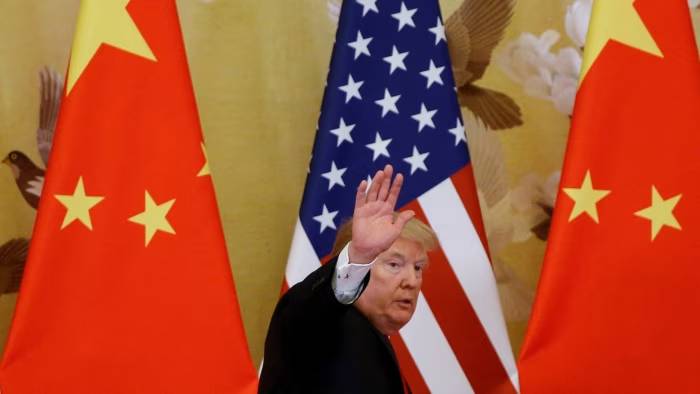Chinese markets find themselves at a crossroads, grappling with the fallout from the Evergrande crisis and the unpredictable influence of former U.S. President Donald Trump. While the Evergrande saga has dominated headlines, it appears that Trump’s political maneuvers could wield even more influence over the future of Chinese markets. This article explores the implications of these intertwined dramas, their impact on market sentiment, and the strategies investors might consider in these uncertain times.
Evergrande’s Looming Liquidation
A recent Hong Kong court ruling has placed Evergrande, the beleaguered Chinese property developer, on the brink of liquidation. Two years after defaulting on its debt, the company faces an uncertain future, with the possibility of mainland Chinese authorities deciding its fate. This development adds another layer of tension to a market already weighed down by sluggish economic data.
Market Woes and Tensions
Chinese markets have suffered this year, with Hong Kong’s Hang Seng stocks index dropping 7.5% and China’s CSI 300 declining by 6%. Efforts by authorities to buoy stocks have shown limited success, leaving a less than favorable picture for investors. In contrast, Japan has seen a 7% rise in stocks in yen terms, and the U.S. S&P 500 remains close to its historic high.
The Contrarian Perspective
Traditional investment wisdom often suggests buying the dip in troubled markets, anticipating that a robust support package may be on the horizon. Patrick Spencer, Vice-Chair of Equities at Baird, sees potential in China as an economy still growing at 5%. He suggests considering a cautious entry into the market despite the prevailing challenges.
Contrarily, some seasoned emerging-markets specialists, like Xavier Hovasse of Carmignac, view investing in China as a venture that demands bravery, knowledge, or perhaps a touch of madness. Hovasse points to China’s “hopeless” property sector mess, emphasizing that the Evergrande situation highlights fundamental issues within the Chinese economy.
READ MORE: Turkey central bank chief quits, citing need to protect her family
Trump’s Influence on Chinese Markets
Surprisingly, it’s not just Evergrande casting a shadow over Chinese markets. According to Hovasse, the assumption that Donald Trump will secure the Republican nomination for the upcoming U.S. presidential election is a significant factor weighing on market sentiment. This concern is even overshadowing the contentious relationship between mainland China and Taiwan.
Trump’s strong result in the Iowa primary caucus and rumors of potential punitive tariffs on Chinese imports have led to a 2% slide in Chinese stocks. Companies with strong ties to the U.S. are feeling the brunt of this, signaling that geopolitical tensions could have a more profound impact on the market than the Evergrande crisis alone.
Geopolitical Uncertainty and Market Caution
Geopolitical consultant Tina Fordham acknowledges the legitimacy of market caution but stresses that Trump’s nomination is not a certainty, and his election victory is far from guaranteed. Fordham highlights Trump’s unpredictable approach to global politics and the bipartisan support for China-bashing. This adds a layer of uncertainty, as Trump’s policies could easily shift.
Impact on Global Investors
For the average investor, the current situation in Chinese markets may not be a cause for major concern. China-related stocks constitute a small fraction of the MSCI All-Country World index, overshadowed by giants like Apple and Microsoft. Moreover, the consensus bet on Chinese stocks from the previous year failed to materialize, leading non-specialist investors to remain cautious.
However, dedicated emerging market investors face a more complex scenario. The MSCI EM benchmark still carries a substantial 22% weighting towards China. This leaves investors with the challenging task of navigating through a market rife with uncertainties.
Strategies for Navigating Chinese Markets
As Chinese markets face turbulence on multiple fronts, investors may consider alternative strategies to mitigate risks:
- Diversification: Reduce exposure to China and explore opportunities in other emerging markets like Mexico or India, which are showing promise.
- Sector-Specific Approach: Avoiding sectors directly affected by the Evergrande crisis, such as real estate, and focusing on industries with more stable prospects can be a prudent strategy.
- US-Linked Companies: Given the current tensions between China and the U.S., investors may opt for companies with less exposure to U.S. regulatory risks.
Chinese markets are grappling with a combination of domestic economic challenges and geopolitical uncertainties. The Evergrande crisis, though significant, may not be the sole driver of market dynamics. The specter of Donald Trump’s potential return to the U.S. political arena and his influence on U.S.-China relations adds another layer of complexity. As investors weigh their options, a nuanced and diversified approach may prove essential in navigating these turbulent waters.

